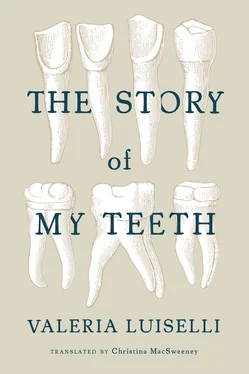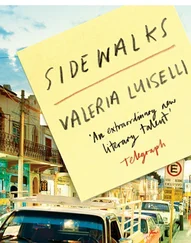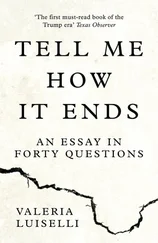I crossed the grounds of the factory, singing beneath the wiry early morning clouds, until I came to a bicycle shelter. Among the workers arriving at the factory, stopping off at the shelter to leave their vehicles, I spotted my wise old friend Tacito — who writes Chinese fortune cookie proverbs for a living — attempting to chain a bicycle to one of the metal tubes. He was wrapped in an ivory-colored toga, his hair neatly combed and his mustache cut painter’s-brush style — as elegant and distinguished as ever. He greeted me effusively and asked how I was, but when I opened my mouth to answer him, he noticed my missing teeth and couldn’t hide his shock.
Quid accidit, Highway?
As you see, my dear friend, I said, I’ve lost my teeth.
E longinquo contemplari, si non nocet, he responded with his accustomed serenity.
Thank you. I think that son of a bitch my son stole them, I said. But I’m not sure. I’m going to go looking for them.
Cum cœperint cum faciunt animos nostros facultas amittatur.
Exactly, my dear friend. Listen, could you lend me your bicycle to search for them?
He told me that the bicycle belonged to his brother, and then asked me if I had happened to come across him. I replied no, I hadn’t seen him in many years. His brother, it seemed, had taken an almost lethal dose of peyote a week before and had wandered off into the streets of Ecatepec. Tacito had been looking for him for several days in order to return his bicycle. I am practical. I proposed a sensible solution:
Instead of chaining it up, why not let me borrow the bicycle, and I’ll look for your brother while I’m trying to find my teeth?
Tacito, in turn, has always been reasonable and generous.
Et spes inanes, et velut somnia quaedam, vigilantium, Highway my friend, he said, offering me the handlebars.
Then, from a leather satchel he had strapped diagonally across his chest, he took a bag of Chinese fortune cookies and placed them in the basket of the bicycle with a solemn gesture:
Antiquam sapientiam Chinese fortune cookies vestram in comitetur vobiscum quaerere.
I thanked him sincerely and mounted the bicycle. Then I crossed Morelos and turned onto Sonora, heading east, determined to fulfill all my tasks, possibly find Tacito’s lost brother, and even perhaps recover my teeth. A wide, clear sky was before me, and the sun was just beginning to show itself among the stark rebars on the housetops.
AT THAT TIME OF day, the only place open was Las Explicaciones, on the corner of Sonora and Las Torres. It’s famous because the coffee costs one peso, a round of bread five, and there are always several copies of that day’s paper. I stopped off for breakfast and asked for a newspaper, and a Nescafé to wet the Chinese fortune cookies Tacito had given me. I extracted the slips of paper on which the fortunes were written and then dunked and soaked each cookie until it was just soggy enough for me to swallow without fear of damaging my bare gums. The slips I put in my trouser pocket for later.
Besides myself, the only other customer in the café was a slender, circumspect young man, his face speckled with tobacco-colored freckles, deep in concentration. He was wearing a bright yellow three-piece suit that was too big for him and a Panama hat. Seated at a table by a window through which the early morning light was beginning to enter, he was holding a pencil and silently writing in a notebook.
From my table, I asked what it was he was writing so much about. His eyes still on the notebook, he said he was just planning a relingo walk.
A what walk? I burbled in my newly acquired toothless old fool voice.
A walk around gaps, sir, around vacant lots, spaces without owners or fixed use, he clarified with those three elucidations.
I opened my mouth like a newly hatched chick, and, pointing to my edentate cavern, I said:
Empty spaces like this one?
The youth raised his eyes, finally interested in me. I took advantage of his attention to continue, being careful not to lose that interest:
What’s your name?
Jacobo de Voragine. But they call me Voragine.
What are you? A singer-songwriter? An artist?
No, he said in a melodramatic tone. I’m a writer and church tour guide in the city. I live by the latter and die by the former.
Ah! So you must know the writer who wrote a book and changed his teeth.
No, sir. Who’s he?
A writer who had all his teeth replaced after writing a book, that’s all.
Fabulous. Fascinating. Amazing, he said hesitatingly, unsure of his adjectives.
And by the way, Gustavo Sánchez Sánchez, or just Highway, at your service. Would you mind if I came and sat there in the sun with you? I don’t want to break your concentration.
Of course, be my guest, please take a seat; in any case, I haven’t had a single idea all morning.
I ordered three more Nescafés — two for me and one for him — and sat down opposite the young man. His bony hands were tipped, I noted, with the short nails of the nervous.
So you’re a newcomer to the neighborhood?
That’s right, sir.
And how do you intend to be a tour guide here if you don’t know the place?
No, the tourists don’t come here. I live in Ecatepec, but I give guided walking tours in the center of Mexico City.
Do you live alone?
No, with two brothers who work in the book trade. I don’t know their names, but between themselves they call each other Darling and Understanding, without distinction. They own a printing press and publisher called Rincón Cultural.
And why do you think you haven’t been able to write today?
I don’t know. Perhaps it’s because I’m terrified of irrelevance.
Irrelevance?
There are already too many things — he went on in the tone of the chronically ill — too many books, too many opinions. Anything I do will only add to the great pile of trash every person leaves behind him. Am I making sense?
Perfect sense. That’s why I’m an auctioneer.
You? You auction works of art?
Anything that comes my way.
For example?
For example, I can auction you my name. I’ve collected six homonyms. I call the series “Circular Gustavos,” because they have to be auctioned through riddled circumlocutions, like Statius’s epithets and periphrases.
How so?
So:
Pisces, Scorpio ascendant. Born in San Andrés, Chalchicamula, March 18, 1911. He was president of Mexico from 1964 to 1970, during which time he: disappeared students, militarily occupied the National Autonomous University of Mexico, imprisoned workers, sacked teachers, doctors, and railway men who were protesting about low wages. He died of colorectal cancer.
Who is it? I asked Voragine.
No idea, Highway. Sorry.
President Gustavo Díaz-Ordaz, of course. Let’s try another.
Born on April 19, 1801, under the sign of Taurus, Libra ascendant. Originator of the study of psychophysics and a visionary pioneer of experimental psychology. He also discovered the famous formula S = KlnI, which describes the nonlinear relationship between psychological sensations and impressions and the intensity of physical stimuli. Active, atheist, womanizer, and a good-hearted man, he died on November 18, 1887.
Who am I referring to?
Sorry, no idea.
Gustav Theodor Fechner. Another:
Sagittarius, writer, fat, French.
Oh! Gustav Flaubert?
Yes, indeed.
O.K., give me another.
O.K.:
Cancer, Aquarius ascendant. He was born on July 7, 1860, and died May 18, 1911. Jewish, a native of Bohemia, he composed Mahler’s Symphonies, 1-10 but didn’t complete the tenth because he died before it was finished. He was married to Mrs. Alma Mahler, who also had relations with Walter Gropius, Franz Werfel, Klimt, Max Burkhard, Alexander von Zemlinsky, Oskar Kokoshka, and Johannes Hollsteiner, to name but a few.
Читать дальше












